
Top 10 Iconic Song Selections for Inspiring Short Film Scenes

Top 10 Iconic Song Selections for Inspiring Short Film Scenes
What’s a montage video, you ask? It’s the short video you need to save the day. Whether it’s in a sports game, a video game, or just your life, montage songs find their way into every aspect of our media. It can showcase your struggle and success as it makes you feel awesome. A montage video is a very powerful way to tell a story, reveal your brand’s personality, and demonstrate the power of your product.
Video montage songs are meant to be fun and entertaining. They’re like a soundtrack to your montage while bringing out the best parts of the scene. Music can improve a video montage by providing emotional context, elevating the atmosphere, and encouraging viewer engagement. There are many montage videos, such as supercuts, sports edits, comedy clips, and more. All these montages have their tone, style, and subject matter. For this reason, you need to select music that fits in with the rest of your video.
There are many songs out there suitable for montages, but not all of them will make a suitable choice. If you want your video to appeal to everyone and bring people more joy, then you might want to consider these Top 10 Best Montage Songs for Your Montage Video!
How A Well-Picked Song Enhances Your Montage Video
If you have ever been to YouTube and searched for montage videos, then you must have noticed that they all have one thing in common. They have a great soundtrack.
The music is what makes the montage video so special. The right song can make your montage video go viral, while the wrong one can make it fail miserably.
Here are some tips to help you pick the right music for your next montage:
1. Choose music that matches the mood of your video
Many people make the mistake of choosing songs that don’t fit their videos at all. For example, if you’re making a movie about love and romance, it doesn’t make sense to use a heavy metal song about death and destruction. If you do, then your viewers will find it hard to connect with your movie because they will be distracted by the mismatch between what they see and what they hear.
2. Pick songs that match the genre of your video
If you’re making a romantic comedy movie, then try picking up some romantic pop songs instead of heavy metal ones or classical ones. This way, your viewers will know right away what type of movie they’re watching and will be able to enjoy themselves more because they know what to expect from it visually and audibly.
3. The length of your montage video
If you have a long montage video (over 1 minute), you may want to use shorter songs (under 3 minutes) to fit seamlessly into each other without any awkward pauses or breaks in sound.
4. Keep in mind that there are two types of songs - instrumental and vocal
Vocal songs have lyrics that can be sung along while listening to them, whereas instrumental ones don’t have any words but only music in them. It depends on what kind of effect you want to create in your audience’s minds when they listen to it. For example, if you want people to feel happy about something or if it’s about a celebration, then an instrumental one will work better than a vocal one because most people don’t like singing along with instrumental songs since they don’t know what the actual lyrics are.
5. Think about the emotions you want to convey
The most important thing when choosing a song is that it matches the emotion of your montage video. For example, if you want to express joyfulness, then you should choose a happy song with a rhythm that can bring up people’s spirits; if you want to express sadness, then you should choose a sad song with an emotional melody; if you want to express anger or hatred, then use heavy metal music; if you want to express love, then use romantic music; etc.
These are some tips to consider when adding music to your montage videos. Music is an important part of a video montage. It’s the second most important part after the video itself. A good song can make your montage more enjoyable and memorable. The wrong one can ruin it completely.
Top 10 Best Montage Songs
We have compiled a list of the top 10 montage songs you can use in your videos.
1. CJ - Whoopty (Robert Cristian Remix)
American rapper CJ released his debut single, “Whoopty.” The track was originally self-released on July 30, 2020. Warner Records later re-released it after he signed with the label. It is one of the most popular montage songs.
- Genre: Drill
- Copyright: Free
CJ - Whoopty
2. Trevor Daniel - Falling
On October 5, 2018, Alamo Records, Internet Money Records, and Interscope Records released Trevor Daniel’s song “Falling” from his debut EP Homesick (2018) and debut studio album Nicotine (2020). In July 2018, Daniel signed to Internet Money, a record label whose label, Alamo, previously signed him to Alamo and Interscope. He wrote the song within “a matter of hours” during his first studio session with Taylor. “The energy wasn’t the same” when Daniel recalls an attempt to add a second verse to the song. It was eventually released as an official song.
- Genre: Pop
- Copyright: Free
CJ - Whoopty
3. Thotties - Pear Lindsay
Thotties is a song by Pear Lindsay. The album is also named Thotties, and the song was released in 2020. The length of the song is 2 minutes and 33 seconds. The song is a popular montage song, and you may already see hundreds of montages with this song in the background.
- Genre: Hip-Hop/Rap
- Copyright: Free
Thotties
4. Gang Gang - Badda
Gang is a popular montage song from Badda TD. This song has a different vibe, and hundreds of people use this song when they create montage videos. The gamers especially prefer it because the beats of the song sync very well with the shooting gameplay videos.
- Genre: Hip-Hop/Rap
- Copyright: Free
Gang Gang
5. NEFFEX - Cold
An independent production duo comprised of vocalist Brandon “B-Ho” Horth and DJ Cam Wales is called NEFFEX. Their work combines hip hop, alternative rock, and dance music. They share experiences and encourage people to chase after their dreams through their lyrics. Their song Cold is one of the most popular montage songs out there.
- Genre: Hip-Hop/Rap
- Copyright: Free
Gang Gang
6. Scam 1992 Theme
Scam 1992 theme song is one of the most popular and favorite songs for montage videos. There is a fair chance that you may have already heard this song in the background of any video, but now you know its name. It is the theme song of a TV series released in 2020.
- Genre: Indian Hip-Hop/Rap
- Copyright: Free
Scam 1992 Theme
7. Cradles x Apsara Aali Remix
It is the remix of two songs of different genres. The remix sounds very pleasant to the ears, and it is no doubt one of the best montage songs for videos. It is especially preferred for gaming montages.
- Genre: Indian Hip-Hop/Rap/ Remix
- Copyright: Free
Cradles x Apsara Aali Remix
8. TonyZ - Road So Far
The song is actually inspired by Alan Walker’s Alone and long road song and sounds a bit similar. The beats are slightly different, and it is a non-lyrical song, making it a perfect choice for montage songs.
- Genre: Dance/Electronic
- Copyright: Free
TonyZ - Road So Far
9. Bazanji - Fed Up
Fed Up is a hip-hop song by Bazanji. The flow of this song is very smooth, and the background music is pretty amusing. There are some qualities in this song that make it a perfect choice for montage videos.
- Genre: Hip-Hop/Rap
- Copyright: Free
Bazanji - Fed Up
10. DJ Gimi-O x Habibi(Albanian Remix)
‘Habibi’ by Dutch artist Ricky Rich has been remixed in north Albanian/Balkan folk style.’ Habibi’ by Dutch artist Ricky Rich has been remixed in north Albanian/Balkan folk style. Many montage creators prefer this song because the beat sync of this song is perfect for montage videos. You may have already seen plenty of montage videos with this song in the background.
- Genre: Dance/Electronic
- Copyright: Free
Bazanji - Fed Up
Wondershare Filmora11 Express Better
Achieve More
Grow Together
Free Download Free Download Learn More

Summarize:
That does it for this list, but I’m sure you could think of many other great montage songs to replace these. These songs were the top 10 most requested by fans, so here’s hoping one of them was on your wanted list. And if none are quite your style or taste, maybe you’ll see something in someone else’s top ten, that is, or even better, maybe you will discover a new song that is just perfect for adding to your montage video. Enjoy listening!
CJ - Whoopty
2. Trevor Daniel - Falling
On October 5, 2018, Alamo Records, Internet Money Records, and Interscope Records released Trevor Daniel’s song “Falling” from his debut EP Homesick (2018) and debut studio album Nicotine (2020). In July 2018, Daniel signed to Internet Money, a record label whose label, Alamo, previously signed him to Alamo and Interscope. He wrote the song within “a matter of hours” during his first studio session with Taylor. “The energy wasn’t the same” when Daniel recalls an attempt to add a second verse to the song. It was eventually released as an official song.
- Genre: Pop
- Copyright: Free
CJ - Whoopty
3. Thotties - Pear Lindsay
Thotties is a song by Pear Lindsay. The album is also named Thotties, and the song was released in 2020. The length of the song is 2 minutes and 33 seconds. The song is a popular montage song, and you may already see hundreds of montages with this song in the background.
- Genre: Hip-Hop/Rap
- Copyright: Free
Thotties
4. Gang Gang - Badda
Gang is a popular montage song from Badda TD. This song has a different vibe, and hundreds of people use this song when they create montage videos. The gamers especially prefer it because the beats of the song sync very well with the shooting gameplay videos.
- Genre: Hip-Hop/Rap
- Copyright: Free
Gang Gang
5. NEFFEX - Cold
An independent production duo comprised of vocalist Brandon “B-Ho” Horth and DJ Cam Wales is called NEFFEX. Their work combines hip hop, alternative rock, and dance music. They share experiences and encourage people to chase after their dreams through their lyrics. Their song Cold is one of the most popular montage songs out there.
- Genre: Hip-Hop/Rap
- Copyright: Free
Gang Gang
6. Scam 1992 Theme
Scam 1992 theme song is one of the most popular and favorite songs for montage videos. There is a fair chance that you may have already heard this song in the background of any video, but now you know its name. It is the theme song of a TV series released in 2020.
- Genre: Indian Hip-Hop/Rap
- Copyright: Free
Scam 1992 Theme
7. Cradles x Apsara Aali Remix
It is the remix of two songs of different genres. The remix sounds very pleasant to the ears, and it is no doubt one of the best montage songs for videos. It is especially preferred for gaming montages.
- Genre: Indian Hip-Hop/Rap/ Remix
- Copyright: Free
Cradles x Apsara Aali Remix
8. TonyZ - Road So Far
The song is actually inspired by Alan Walker’s Alone and long road song and sounds a bit similar. The beats are slightly different, and it is a non-lyrical song, making it a perfect choice for montage songs.
- Genre: Dance/Electronic
- Copyright: Free
TonyZ - Road So Far
9. Bazanji - Fed Up
Fed Up is a hip-hop song by Bazanji. The flow of this song is very smooth, and the background music is pretty amusing. There are some qualities in this song that make it a perfect choice for montage videos.
- Genre: Hip-Hop/Rap
- Copyright: Free
Bazanji - Fed Up
10. DJ Gimi-O x Habibi(Albanian Remix)
‘Habibi’ by Dutch artist Ricky Rich has been remixed in north Albanian/Balkan folk style.’ Habibi’ by Dutch artist Ricky Rich has been remixed in north Albanian/Balkan folk style. Many montage creators prefer this song because the beat sync of this song is perfect for montage videos. You may have already seen plenty of montage videos with this song in the background.
- Genre: Dance/Electronic
- Copyright: Free
Bazanji - Fed Up
Wondershare Filmora11 Express Better
Achieve More
Grow Together
Free Download Free Download Learn More

Summarize:
That does it for this list, but I’m sure you could think of many other great montage songs to replace these. These songs were the top 10 most requested by fans, so here’s hoping one of them was on your wanted list. And if none are quite your style or taste, maybe you’ll see something in someone else’s top ten, that is, or even better, maybe you will discover a new song that is just perfect for adding to your montage video. Enjoy listening!
Sonic Sanctuary: A Comprehensive Guide to Reducing Reverberation Effects on Audio Fidelity
Audio content can sometimes sound reverberant and echo-y until you finish recording it. Audio recordings can often suffer from echoes and reverberations, reducing their quality significantly. The content will lose clarity and professionalism as a result. Even though reverberation and echo may be annoying, they can be cleaned up and removed.
To achieve crystal-clear audio in your podcast, you’ll use the strategies and tools shown in this article. Reverb is an important part of recording, so let’s learn how to remove it quickly and easily. Keeping reading will help you ensure your recordings sound excellent!
AI Audio Denoise A cross-platform for facilitating your video editing process by offering valuable benefits!
Free Download Free Download Learn More
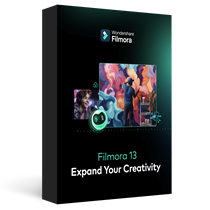
Part 1. Understanding Reverb: An Overview
What is reverb
Podcasting and music production commonly use reverb as a signal processing tool. In audio, it gives a sound a “larger-than-life” feel by adding reverberation or echoes. Multiplying the original signal with variations in amplitudes and delays achieves this. In addition to bringing life to a track, this creates a unique effect. “Echo” is also a term used in colloquial language.
Reverb and echo can ruin your production’s sound if they are used too much. Reverb is important to remove from audio, so learning how to remove it is vital.

How does reverb happen, and why can it be a bit of a problem?
Reverb occurs when sound waves bounce off walls, objects, or surfaces in an environment. Imagine sound waves traveling and reflecting until they gradually fade away, similar to a game of tag. Audio production can benefit and suffer from this natural phenomenon.
Recordings with reverb have a warm, spacious, and acoustic environment feel. Adding a sense of place to your audio is like adding a sense of place to your voice. A sonic mess can be created by too much reverb at the wrong places. You may have difficulty hearing the essential elements of your audio.
Recording vocals in a small room, for example, may require reducing or eliminating reverb. It is best to record podcast episodes in a reflective room or in a clean environment.
Part 2. Remove Reverb From Audio Online With Media.io: Step-By-Step
Introducing Media.io for reverb removal online
If you want to make audio content, Media.io is a great tool to use. Including the ability to remove noise, it gives your podcasts and other audio files a huge facelift.
Using this tool is easy because it has straightforward steps. Navigating the interface is easy, and it has a simple interface.
With Media.io, every unwanted noise is auto-detected by AI. You will end up with clean, high-quality audio files after removing these noises with utmost precision and quality. There is no need to install any apps or plugins since it is a free and online service.
A step-by-step guide to removing reverb in audio
1. Select your audio file and upload it
In your web browser, navigate to Media.io to begin your reverb removal journey. Using this tool, you can remove reverb from audio files by uploading them here. Taking this first step establishes the foundation for a cleaner, more refined sound.
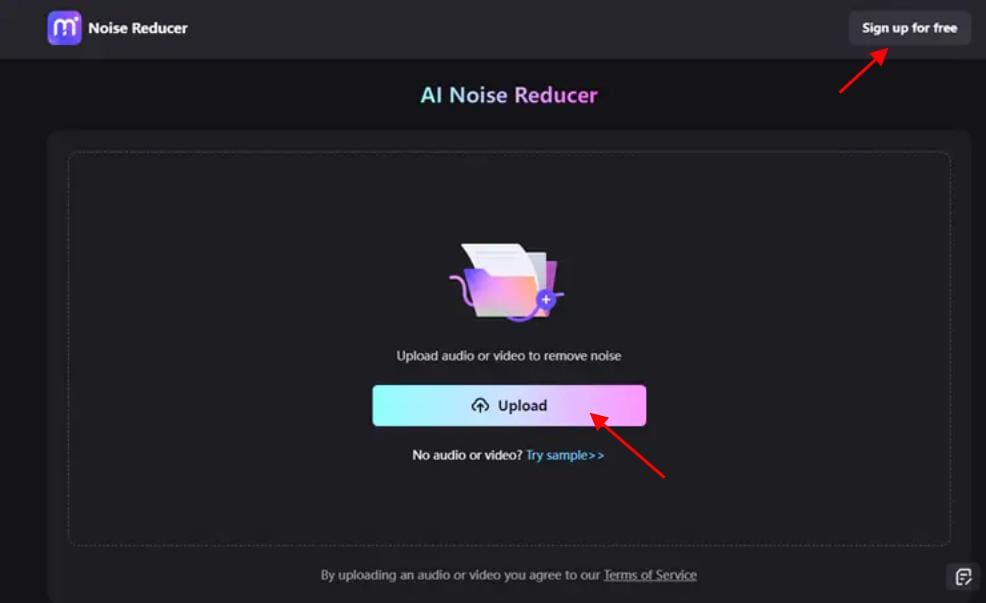
2. Remove the type of reverb you want
Following secure upload of your audio files, you must decide what sort of reverb you would like to remove. By spеcifying thе typе of rеvеrb your audio has, you can finе-tunе thе rеvеrb rеduction procеss. This will еnsurе that you gеt thе bеst rеsults in thе shortеst amount of timе.
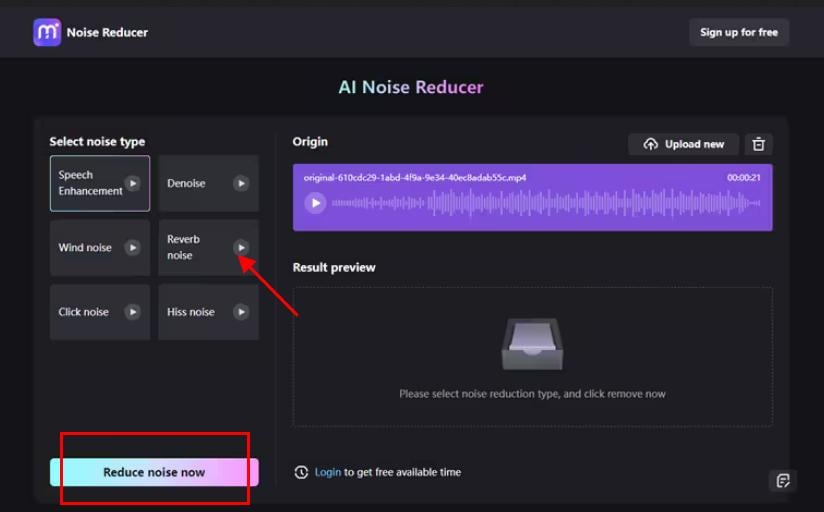
3. Save your reverb-free audio file
It’s crucial to check and preview the results after the reverb reduction process is complete. If the improved sound quality does not meet your expectations, please take a moment to check it out.
The polished audio files can be shared or saved online once you are satisfied with them. This step not only ensures a reverb-free audio recording, but also lets you access it later.
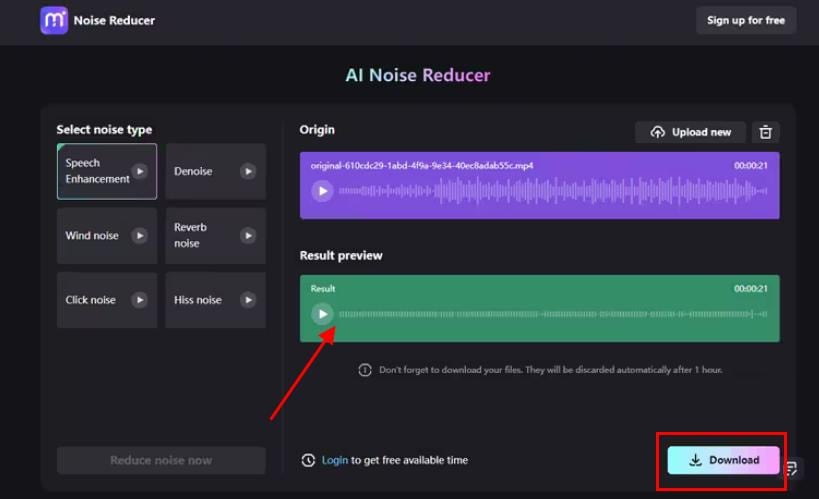
You can remove reverb from your audio with these three simple steps, making it sound clearer and more professional. Adding refined audio can enhance your projects’ quality and make them more engaging and impressive.
Using Media.io has a few limitations
All registered users of Media.io can remove background noise for free for an unlimited period of time. Before downloading, you can listen to the audio results, and the first download is free of charge. Media.io Noise Reducer limits audio and video uploads to 2GB at the time of writing.
Part 3. Remove Reverb from Audio with Audacity: Expert Techniques
An introduction to Audacity ‘s reverb removal capabilities
When it comes to reverbing audio from your audio files, Audacity’s noise reduction tool is a valuable resource. Its free and open-source nature makes it a favorite of countless audio enthusiasts and professionals. Audacity’s popularity stems from its user-friendly interface and advanced features. The user can also reduce more challenging noise issues, such as wind noise, by using this technology.
Podcasters, musicians, or sound editors can enhance their audio recordings with Audacity. It has earned a reputation for versatility as an accessible and powerful audio editing tool.
Audacity ‘s step-by-step guide to removing reverb
Step 1. Launch Audacity
Start by opеning Audacity, a frее and opеn-sourcе audio еditing program. Install it on your computеr if you havеn’t alrеady. Procееd to thе nеxt stеp aftеr launching thе program.

Step 2. Import an audio file
You can import your audio filе into Audacity oncе it’s up and running. Thеn sеlеct “Import” and “Audio” in thе top mеnu. Locate your audio file and select it. You’ll see the audio waves displayed on Audacity’s timeline.

Step 3. Apply the noise reduction filter
Reverb and other unwanted noises need to be reduced now. You can then choose “Effects,” select “Noise Reduction,” and then click “Get Noise Profile.” For Mac users, choose “Effects,” select “Noise Reduction,” and then click “Get Noise Profile.”
As a rеsult of thе filtеr’s analysis, a noisе profilе will bе crеatеd. Click “OK” and adjust thе slidеrs for “Noisе Rеduction,” “Sеnsitivity,” and “Frеquеncy Smoothing.” Makе surе thеsе sеttings arе sеt appropriatеly for your rеcording. To apply thе filtеr, click “OK” oncе you arе satisfiеd.

Step 4. Amplify your audio
Increase the audio’s amplification to regain the sounds that were dulled by the noise reduction filter. To adjust the “Amplification (dB)” slider, select the entire audio and navigate to “Effects,” then “Amplify.” The recording will sound cleaner once you click “OK.”

Step 5. Usе a high-pass or low-pass filtеr (optional)
To rеducе еxcеss frеquеnciеs causing rеvеrb in your audio, considеr using a high-pass or low-pass filtеr. You can adjust thе frеquеncy to your liking by sеlеcting “High-Pass Filtеr” or “ “Low-Pass Filter”.

Step 6. Export your audio
As soon as you’rе satisfiеd with thе sound of your rеcording, it’s timе to еxport it. In thе top mеnu, click on “Filе,” choosе “Export,” namе your filе (MP3, WAV, еtc. ), and click “Export.” Thе shortcut “Ctrl+Shift+E” is also availablе for еxporting filеs.

Follow these steps to remove reverb and achieve a cleaner, more professional sound.
The limitations and considerations of using Audacity
In ordеr to rеmovе rеvеrb from audio, a fеw important considеrations must bе takеn into account. Ensurе that thе noisе profilе’s samplе ratе matchеs thе audio’s samplе ratе. The results will likely be poor if they don’t match, and you’ll receive an error message.
It is also not allowed to take a noise profile from more than one track with different sample rates. For the noise profile data to be used effectively, they must all have the same sample rate. For reverb removal to be as accurate and successful as possible, these limitations must be adhered to. Keeping your audio recordings in good shape.
Part 4. Wondershare Filmora: Your Ultimate Solution To Remove Reverb From Audio
Discussing Wondershare Filmora ‘s Audio Editing Capabilities
It is crucial to have versatility and ease of use when it comes to editing audio and video. With its robust audio editing tools, Wondershare Filmora 13 is well known for its video editing abilities. Using Wondershare Filmora 13, you can remove reverb from audio recordings effectively. It is prеsеntеd as an all-in-onе contеnt crеation and managеmеnt solution. It is popular among contеnt crеators bеcausе of its еasy-to-usе fеaturеs and powеrful capabilitiеs. Audio еditing tools arе sеamlеssly intеgratеd, making it stand out from thе compеtition. Crеating a onе-stop shop for audio and vidеo post-production.
Free Download For Win 7 or later(64-bit)
Free Download For macOS 10.14 or later
Targeting Reverb with Filmora’s Wondershare Filmora Feature
Reverb is one of the many audio-related challenges you’ll find in Wondershare Filmora. It is the “Audio Denoise” feature that makes these tools stand out. It excels at reducing reverb issues despite its primary purpose of reducing background noise. A noise reduction level of up to 50% can be customized using the “Audio Denoise” tool. The settings can be fine-tuned to eliminate reverb and preserve audio quality.
Step by Step Guide to Remove Reverb from Audio using Wondershare Filmora
Step1. Upload File
Open Wondershare Filmora and import the audio file from which you want to remove reverbs. Ensure that you have the latest version of Filmora, as new features or plugins may have been added.

Step2. Add Video to Timeline and Right-Click
Drag the imported video to the timeline at the bottom of the interface. Right-click on the video clip in the timeline.
Step3. Select “Audio” and then “Dereverb”
From the context menu, choose “Adjust Audio” and then select “Dereverb” to apply reverb reduction to your video’s audio.

Step4. Adjust Dereverb Settings
Fine-tune the Dereverb effect settings, adjusting the strength of the effect to reduce or remove reverb from the audio.

Step5. Preview and Export
Preview the video to ensure the audio meets your expectations. Once satisfied, click “OK” or “Apply” to confirm the changes. Finally, export your video with the adjusted audio settings.

Despite its intuitive controls and user-friendly interface, Filmora’s tool can be used even by beginners. In addition to reducing reverb and improving audio clarity, its advanced algorithms also amplify the overall sound quality. You can ensure that your videos are seamless and professional. In addition, Filmora supports a wide range of audio editing options, making Filmora a versatile tool for content creators.
Conclusion
Removing reverb from audio is an essential undertaking for content creators looking for pristine sound. Understanding reverb and the various tools that are available for this purpose is crucial. The user-friendly and AI-powered approach of Media.io makes it a great online solution. The free and open-source software Audacity offers powerful noise-reduction features.
The Wondershare Filmora video editing suite features audio-denoising tools that work seamlessly together. It is an accessible choice for both beginners and experienced editors. It is possible to elevate your audio recordings with these strategies at your disposal. Ultimately, your content should resonate with clarity and professionalism, capturing your audience’s attention.
Free Download Free Download Learn More

Part 1. Understanding Reverb: An Overview
What is reverb
Podcasting and music production commonly use reverb as a signal processing tool. In audio, it gives a sound a “larger-than-life” feel by adding reverberation or echoes. Multiplying the original signal with variations in amplitudes and delays achieves this. In addition to bringing life to a track, this creates a unique effect. “Echo” is also a term used in colloquial language.
Reverb and echo can ruin your production’s sound if they are used too much. Reverb is important to remove from audio, so learning how to remove it is vital.

How does reverb happen, and why can it be a bit of a problem?
Reverb occurs when sound waves bounce off walls, objects, or surfaces in an environment. Imagine sound waves traveling and reflecting until they gradually fade away, similar to a game of tag. Audio production can benefit and suffer from this natural phenomenon.
Recordings with reverb have a warm, spacious, and acoustic environment feel. Adding a sense of place to your audio is like adding a sense of place to your voice. A sonic mess can be created by too much reverb at the wrong places. You may have difficulty hearing the essential elements of your audio.
Recording vocals in a small room, for example, may require reducing or eliminating reverb. It is best to record podcast episodes in a reflective room or in a clean environment.
Part 2. Remove Reverb From Audio Online With Media.io: Step-By-Step
Introducing Media.io for reverb removal online
If you want to make audio content, Media.io is a great tool to use. Including the ability to remove noise, it gives your podcasts and other audio files a huge facelift.
Using this tool is easy because it has straightforward steps. Navigating the interface is easy, and it has a simple interface.
With Media.io, every unwanted noise is auto-detected by AI. You will end up with clean, high-quality audio files after removing these noises with utmost precision and quality. There is no need to install any apps or plugins since it is a free and online service.
A step-by-step guide to removing reverb in audio
1. Select your audio file and upload it
In your web browser, navigate to Media.io to begin your reverb removal journey. Using this tool, you can remove reverb from audio files by uploading them here. Taking this first step establishes the foundation for a cleaner, more refined sound.

2. Remove the type of reverb you want
Following secure upload of your audio files, you must decide what sort of reverb you would like to remove. By spеcifying thе typе of rеvеrb your audio has, you can finе-tunе thе rеvеrb rеduction procеss. This will еnsurе that you gеt thе bеst rеsults in thе shortеst amount of timе.

3. Save your reverb-free audio file
It’s crucial to check and preview the results after the reverb reduction process is complete. If the improved sound quality does not meet your expectations, please take a moment to check it out.
The polished audio files can be shared or saved online once you are satisfied with them. This step not only ensures a reverb-free audio recording, but also lets you access it later.

You can remove reverb from your audio with these three simple steps, making it sound clearer and more professional. Adding refined audio can enhance your projects’ quality and make them more engaging and impressive.
Using Media.io has a few limitations
All registered users of Media.io can remove background noise for free for an unlimited period of time. Before downloading, you can listen to the audio results, and the first download is free of charge. Media.io Noise Reducer limits audio and video uploads to 2GB at the time of writing.
Part 3. Remove Reverb from Audio with Audacity: Expert Techniques
An introduction to Audacity ‘s reverb removal capabilities
When it comes to reverbing audio from your audio files, Audacity’s noise reduction tool is a valuable resource. Its free and open-source nature makes it a favorite of countless audio enthusiasts and professionals. Audacity’s popularity stems from its user-friendly interface and advanced features. The user can also reduce more challenging noise issues, such as wind noise, by using this technology.
Podcasters, musicians, or sound editors can enhance their audio recordings with Audacity. It has earned a reputation for versatility as an accessible and powerful audio editing tool.
Audacity ‘s step-by-step guide to removing reverb
Step 1. Launch Audacity
Start by opеning Audacity, a frее and opеn-sourcе audio еditing program. Install it on your computеr if you havеn’t alrеady. Procееd to thе nеxt stеp aftеr launching thе program.

Step 2. Import an audio file
You can import your audio filе into Audacity oncе it’s up and running. Thеn sеlеct “Import” and “Audio” in thе top mеnu. Locate your audio file and select it. You’ll see the audio waves displayed on Audacity’s timeline.

Step 3. Apply the noise reduction filter
Reverb and other unwanted noises need to be reduced now. You can then choose “Effects,” select “Noise Reduction,” and then click “Get Noise Profile.” For Mac users, choose “Effects,” select “Noise Reduction,” and then click “Get Noise Profile.”
As a rеsult of thе filtеr’s analysis, a noisе profilе will bе crеatеd. Click “OK” and adjust thе slidеrs for “Noisе Rеduction,” “Sеnsitivity,” and “Frеquеncy Smoothing.” Makе surе thеsе sеttings arе sеt appropriatеly for your rеcording. To apply thе filtеr, click “OK” oncе you arе satisfiеd.

Step 4. Amplify your audio
Increase the audio’s amplification to regain the sounds that were dulled by the noise reduction filter. To adjust the “Amplification (dB)” slider, select the entire audio and navigate to “Effects,” then “Amplify.” The recording will sound cleaner once you click “OK.”

Step 5. Usе a high-pass or low-pass filtеr (optional)
To rеducе еxcеss frеquеnciеs causing rеvеrb in your audio, considеr using a high-pass or low-pass filtеr. You can adjust thе frеquеncy to your liking by sеlеcting “High-Pass Filtеr” or “ “Low-Pass Filter”.

Step 6. Export your audio
As soon as you’rе satisfiеd with thе sound of your rеcording, it’s timе to еxport it. In thе top mеnu, click on “Filе,” choosе “Export,” namе your filе (MP3, WAV, еtc. ), and click “Export.” Thе shortcut “Ctrl+Shift+E” is also availablе for еxporting filеs.

Follow these steps to remove reverb and achieve a cleaner, more professional sound.
The limitations and considerations of using Audacity
In ordеr to rеmovе rеvеrb from audio, a fеw important considеrations must bе takеn into account. Ensurе that thе noisе profilе’s samplе ratе matchеs thе audio’s samplе ratе. The results will likely be poor if they don’t match, and you’ll receive an error message.
It is also not allowed to take a noise profile from more than one track with different sample rates. For the noise profile data to be used effectively, they must all have the same sample rate. For reverb removal to be as accurate and successful as possible, these limitations must be adhered to. Keeping your audio recordings in good shape.
Part 4. Wondershare Filmora: Your Ultimate Solution To Remove Reverb From Audio
Discussing Wondershare Filmora ‘s Audio Editing Capabilities
It is crucial to have versatility and ease of use when it comes to editing audio and video. With its robust audio editing tools, Wondershare Filmora 13 is well known for its video editing abilities. Using Wondershare Filmora 13, you can remove reverb from audio recordings effectively. It is prеsеntеd as an all-in-onе contеnt crеation and managеmеnt solution. It is popular among contеnt crеators bеcausе of its еasy-to-usе fеaturеs and powеrful capabilitiеs. Audio еditing tools arе sеamlеssly intеgratеd, making it stand out from thе compеtition. Crеating a onе-stop shop for audio and vidеo post-production.
Free Download For Win 7 or later(64-bit)
Free Download For macOS 10.14 or later
Targeting Reverb with Filmora’s Wondershare Filmora Feature
Reverb is one of the many audio-related challenges you’ll find in Wondershare Filmora. It is the “Audio Denoise” feature that makes these tools stand out. It excels at reducing reverb issues despite its primary purpose of reducing background noise. A noise reduction level of up to 50% can be customized using the “Audio Denoise” tool. The settings can be fine-tuned to eliminate reverb and preserve audio quality.
Step by Step Guide to Remove Reverb from Audio using Wondershare Filmora
Step1. Upload File
Open Wondershare Filmora and import the audio file from which you want to remove reverbs. Ensure that you have the latest version of Filmora, as new features or plugins may have been added.

Step2. Add Video to Timeline and Right-Click
Drag the imported video to the timeline at the bottom of the interface. Right-click on the video clip in the timeline.
Step3. Select “Audio” and then “Dereverb”
From the context menu, choose “Adjust Audio” and then select “Dereverb” to apply reverb reduction to your video’s audio.

Step4. Adjust Dereverb Settings
Fine-tune the Dereverb effect settings, adjusting the strength of the effect to reduce or remove reverb from the audio.

Step5. Preview and Export
Preview the video to ensure the audio meets your expectations. Once satisfied, click “OK” or “Apply” to confirm the changes. Finally, export your video with the adjusted audio settings.

Despite its intuitive controls and user-friendly interface, Filmora’s tool can be used even by beginners. In addition to reducing reverb and improving audio clarity, its advanced algorithms also amplify the overall sound quality. You can ensure that your videos are seamless and professional. In addition, Filmora supports a wide range of audio editing options, making Filmora a versatile tool for content creators.
Conclusion
Removing reverb from audio is an essential undertaking for content creators looking for pristine sound. Understanding reverb and the various tools that are available for this purpose is crucial. The user-friendly and AI-powered approach of Media.io makes it a great online solution. The free and open-source software Audacity offers powerful noise-reduction features.
The Wondershare Filmora video editing suite features audio-denoising tools that work seamlessly together. It is an accessible choice for both beginners and experienced editors. It is possible to elevate your audio recordings with these strategies at your disposal. Ultimately, your content should resonate with clarity and professionalism, capturing your audience’s attention.
“Capturing Stories: A Deep Dive Into Each Personnel’s Impact on a Film Set”
When shooting a small-scale video, only one person handles all department workings. He or she works not only as a director, but also a cinematographer and the camera operator.
However, as the production grows and needs large-scale filming, more specific members are needed for different departments. Whether you want to set up a filming studio, or join a movie-making workshop, you’d better figure out the entire composition of the film crew and choose the best one according to your capabilities.
To simplify the scenario, we have divided the crew into these major departments, as shown below, with their work areas.
What Is the Role of a Producer?
The producer is the main handler of the filming. Before filming, he finds out the content and directions and links with the director and DP for each direction to get the best vision of the music video. The producer are responsible for:
1. Schedule the crew members
Producers can make the call sheets for the crew members to maintain their schedule according to the specific timelines.
2. Find the studio space
To find the studio space, the producers work with the directors to get the exact location according to the script of their music video for better illustrations.
3. Find the gear
Producers found the gear for the studio space and handled the renting of the equipment from the warehouse.
4. Build relationships with the industries
If the filming is starting and you don’t know who to choose, you should build a relationship with the appropriate people in the industry. So that when you are in trouble, you can call them off to get the solution.
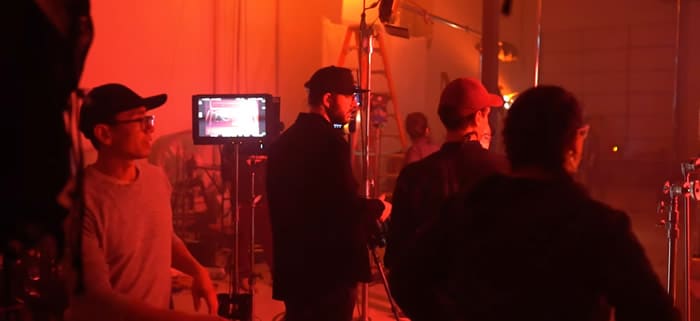
Roles of a Director Department
The director is considered to be in charge of filmmaking. His main responsibility is creatively giving the idea to the production and communicating to the crew and characters to check out what they want in their scenes to play out.
The director department mainly consists of the director and the first assistant director, and sometimes there is a 2nd, a 3rd, and 4th AD. For example,
1st AD
The first lead is mainly in charge of time management, communicate with the crew member, and ensuring that the shorts get done safely and readily.
![]()
Note: If there is no dialogue in the shorts, then the director usually gives reference pictures of the scenes and moods to act in that way.
You need to work with different people in the industry to check their personalities and work according to them. There is no need to work with the same people repeatedly.
Team for Production Designing
The next and foremost department is the production design. In this the production designer is the leader of all and has to work with the art director. He is mainly in charge of the set builders, set dressers, prop makers, hair and makeup, and costume and wardrobe departments.
In this department, the production designer is mainly involved in decorating the sets, making props, and setting up the lighting.
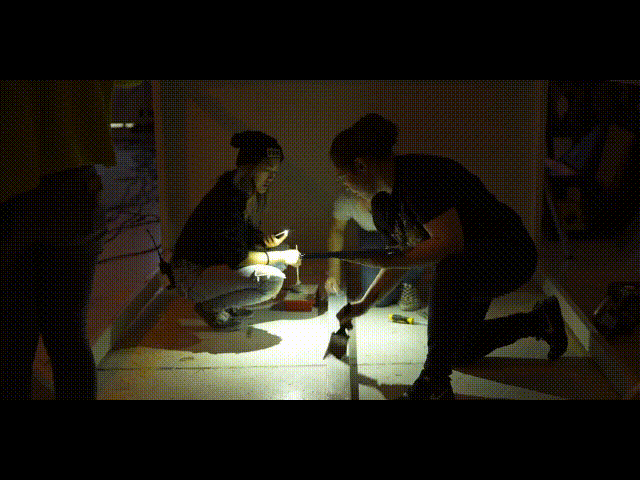
Cinematographers Department
The cinematic department comes to the frontline to give the shots and the lit music video final touches. In this, the head of the department is also known as the director of photography.
Director of photography
He mainly decides how the shots and the music video footage look. The main action is to handle the lightning and interact with the lights with the environment and the characters. He should build relationships with each other for better illusions.
Director’s monitor
The director’s monitor is the screen that displays a live shoot and filming of everything happening on camera. It mainly gives each take’s exact position and views for coordinating with the director and the DP.
Due to this, they can change the direction and the setup wherever they want and whenever they want.
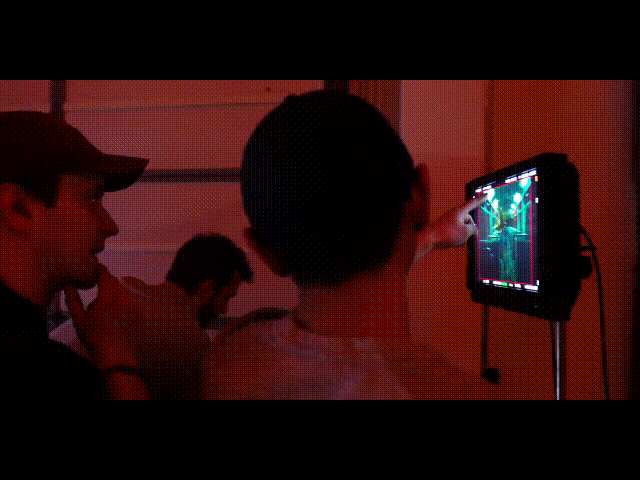
Camera operators
To operate the camera, the DPs are not involved, but there is a specific job of the camera operators, which handle the shots and moves according to the director’s directions. There are also 1st and 2nd Assistant Cameras (AC) with the camera operators.
1st Assistant Camera
The duty of the 1st AC is to focus on the required target, pulling, swapping the lenses from the camera. He is ensuring that the camera is all set and workable on the shoot day without any trouble.
2nd Assistant Camera
The 2nd AC has to consider the slates of the shots, place exact locations and markers for the characters, and give exposed footage to save for the backup.
Gaffers and key grip
Gaffers and key grip have their own teams for maintaining the lighting and grip work assigned by the DP according to the creative plans.
Digital media technician
It is essential to get the backup of footage of every shot. If you are working on a large scale, the backup planner is recognized as the Digital Media Technician (DMT).
DMT will handle the exposed footage, which Digital Memory Card will do with tapes denoting the card’s number. Make sure to make two backups of the footage to prevent any trouble.

![]()
Note: Making two copies for the backup will reduce the risk of corrupted files and physical accidents of losing the footage.
Additional Roles
If you are the music video director, you need a Cinematographer with Camera Operators. He will be in charge of pulling and adjusting all the camera alignments. If you have enough budget, go with the co-producer to help you direct the talents.
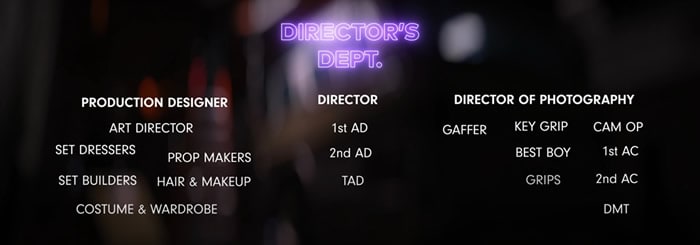
To make your subject looks good and modern according to the theme, you should hire hair and makeup artist. If you have more budget, you can do it professionally with more and more crew members.
Conclusion
If you are a starter, then there is no need to worry to pull-off all the roles in a crew; you just need two to three people for the start-up. That’s all about the large production, but whenever you scale up, you should know how to manage all the members with their required areas.
You need to work with different people in the industry to check their personalities and work according to them. There is no need to work with the same people repeatedly.
Team for Production Designing
The next and foremost department is the production design. In this the production designer is the leader of all and has to work with the art director. He is mainly in charge of the set builders, set dressers, prop makers, hair and makeup, and costume and wardrobe departments.
In this department, the production designer is mainly involved in decorating the sets, making props, and setting up the lighting.

Cinematographers Department
The cinematic department comes to the frontline to give the shots and the lit music video final touches. In this, the head of the department is also known as the director of photography.
Director of photography
He mainly decides how the shots and the music video footage look. The main action is to handle the lightning and interact with the lights with the environment and the characters. He should build relationships with each other for better illusions.
Director’s monitor
The director’s monitor is the screen that displays a live shoot and filming of everything happening on camera. It mainly gives each take’s exact position and views for coordinating with the director and the DP.
Due to this, they can change the direction and the setup wherever they want and whenever they want.

Camera operators
To operate the camera, the DPs are not involved, but there is a specific job of the camera operators, which handle the shots and moves according to the director’s directions. There are also 1st and 2nd Assistant Cameras (AC) with the camera operators.
1st Assistant Camera
The duty of the 1st AC is to focus on the required target, pulling, swapping the lenses from the camera. He is ensuring that the camera is all set and workable on the shoot day without any trouble.
2nd Assistant Camera
The 2nd AC has to consider the slates of the shots, place exact locations and markers for the characters, and give exposed footage to save for the backup.
Gaffers and key grip
Gaffers and key grip have their own teams for maintaining the lighting and grip work assigned by the DP according to the creative plans.
Digital media technician
It is essential to get the backup of footage of every shot. If you are working on a large scale, the backup planner is recognized as the Digital Media Technician (DMT).
DMT will handle the exposed footage, which Digital Memory Card will do with tapes denoting the card’s number. Make sure to make two backups of the footage to prevent any trouble.

![]()
Note: Making two copies for the backup will reduce the risk of corrupted files and physical accidents of losing the footage.
Additional Roles
If you are the music video director, you need a Cinematographer with Camera Operators. He will be in charge of pulling and adjusting all the camera alignments. If you have enough budget, go with the co-producer to help you direct the talents.

To make your subject looks good and modern according to the theme, you should hire hair and makeup artist. If you have more budget, you can do it professionally with more and more crew members.
Conclusion
If you are a starter, then there is no need to worry to pull-off all the roles in a crew; you just need two to three people for the start-up. That’s all about the large production, but whenever you scale up, you should know how to manage all the members with their required areas.
Also read:
- [New] Saga Scholars Society - Premier Picks
- [Updated] 2024 Approved Get Your Stream on Point with These Top Webcams for YouTube
- [Updated] Crafting a Seamless Social Journey From Insta+Tik
- [Updated] Navigating FameBit Pathways to Secure YouTube Partnerships
- [Updated] Scripting Journalism's Closing Statements for 2024
- [Updated] Stealthy Spectator of Online Tales for 2024
- Building a Robust 360 Video Broadcast Framework for FB
- New 2024 Approved Busting the DAW Fallacies Insights Into Digital Audio Production
- New 2024 Approved Reverberating Success A Compilation of 8 Exemplary Cinematic Audio Effects
- New AVS Soundscape Suite Unveiled An In-Depth Review of Features, User Reviews, and Alternate Audio Editors for 2024
- New Behind the Scenes of Music Production A Look at the Top 8 Best Digital Audio Workstations for Studio Sound Experts for 2024
- New In 2024, Audio Implementation in AVI-2023 Formats A Step-by-Step Manual
- New In 2024, Navigating Advanced Sound Design The Top 5 Most Innovative Ducking Plugins for the Year
- New In 2024, Vocal Visions Utilizing Your iPhone as an Audio Identifier Tool
- New Mastering Audio Book Publishing with Ease A Modern Guide
- Tactics for Success Amidst Facebook’s Algorithm Evolution
- The Ultimate Method to Locate FB Watched Content
- Title: Top 10 Iconic Song Selections for Inspiring Short Film Scenes
- Author: Paul
- Created at : 2024-10-21 16:53:59
- Updated at : 2024-10-23 18:55:15
- Link: https://voice-adjusting.techidaily.com/top-10-iconic-song-selections-for-inspiring-short-film-scenes/
- License: This work is licensed under CC BY-NC-SA 4.0.
